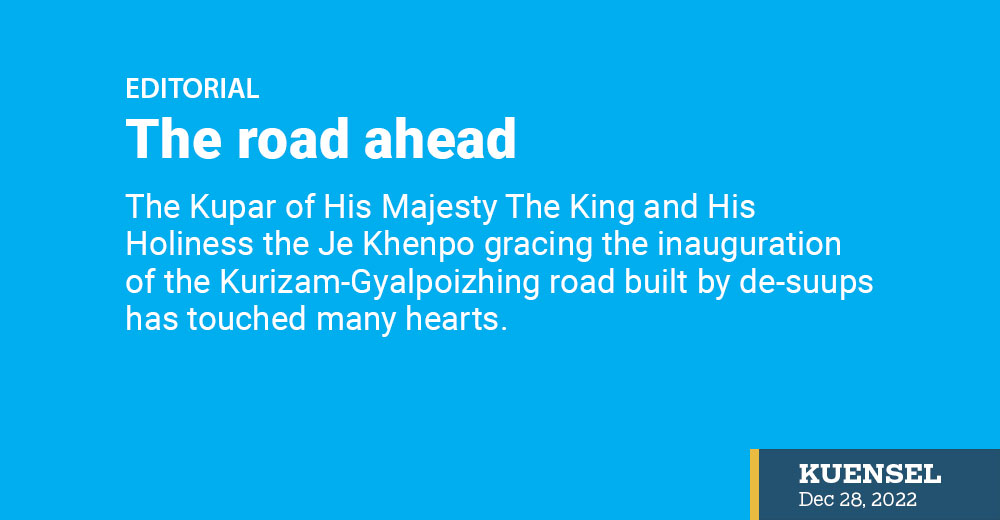The Kupar of His Majesty The King and His Holiness the Je Khenpo gracing the inauguration of the Kurizam-Gyalpoizhing road built by de-suups has touched many hearts. Some had changed their Facebook profile picture using the Kupar as a show of love, affection and appreciation. Beyond the Kupar is a story worthy of greater appreciation.
His Majesty The King’s vision of skilling Bhutanese youth is paying dividends. If starting the DeSuung programme was a master stroke, skilling young Bhutanese is a triumph in many ways. The 7.3 km road was widened and improved to a higher standard in a year. If the aim was to pilot quality road construction and develop best practices by Bhutanese, the evidence is there for many to see.
Bhutan has been building roads since the first five-year plan in the 1960s. We are still building, widening and repairing roads. In the meantime, the road is one infrastructure that is visible and also on the priority list of political parties. Drive around the country and we can see how roads have reached every nook and corner of the country. Unfortunately, quality is a big issue and some of the roads, particularly farm roads, are not pliable after investing millions.
We have constructed enough roads. The priority will now have to change from building to widening width and shortening distances. Technology has improved in road-building and perhaps, we will see an alternate route from Thimphu to Phuentsholing following the Wangchhu or join Wangdue to Chamgang to cut the distance by hours for those travelling to the east and southeast. Cutting distance could mean a reduction in transportation costs. As a landlocked country, the cost of transportation is one of the main drivers of inflation.
The DeSuung National Service Road Project could contribute significantly to this objective. The idea is not to make our youth construction workers. We will still require hands to turn the bitumen and gravel mix, but what we need is people with skills and dedication. The project was designed to build the capabilities of the de-suups so that they could become skilled workers, competent supervisors, effective managers and capable contractors in the future.
Six of them are trained as skilled operators in specialised machines, three in surveying and 13 as skilled construction workers. All of them are equipped to assist and understand general construction practices. This is a boon to the construction industry, especially road construction. The road they built in Gyalpoizhing could be the benchmark in terms of quality. As more get skilled, the construction could depend on locally-trained professionals for skills and knowledge. The big difference is that de-suups have taken the oath of allegiance and will not be lured by what is happening in the industry.
Critics say that DeSuung can deliver because they are not bogged down by bureaucratic procedures. If that is true, we need to remove the bureaucratic obstacles to let the industry improve and thereby our road infrastructure. Driving beyond the pothole-riddled capital road, many will feel potholes are not a nuisance as they drive on long stretches of roads that had been damaged soon after the inauguration.


